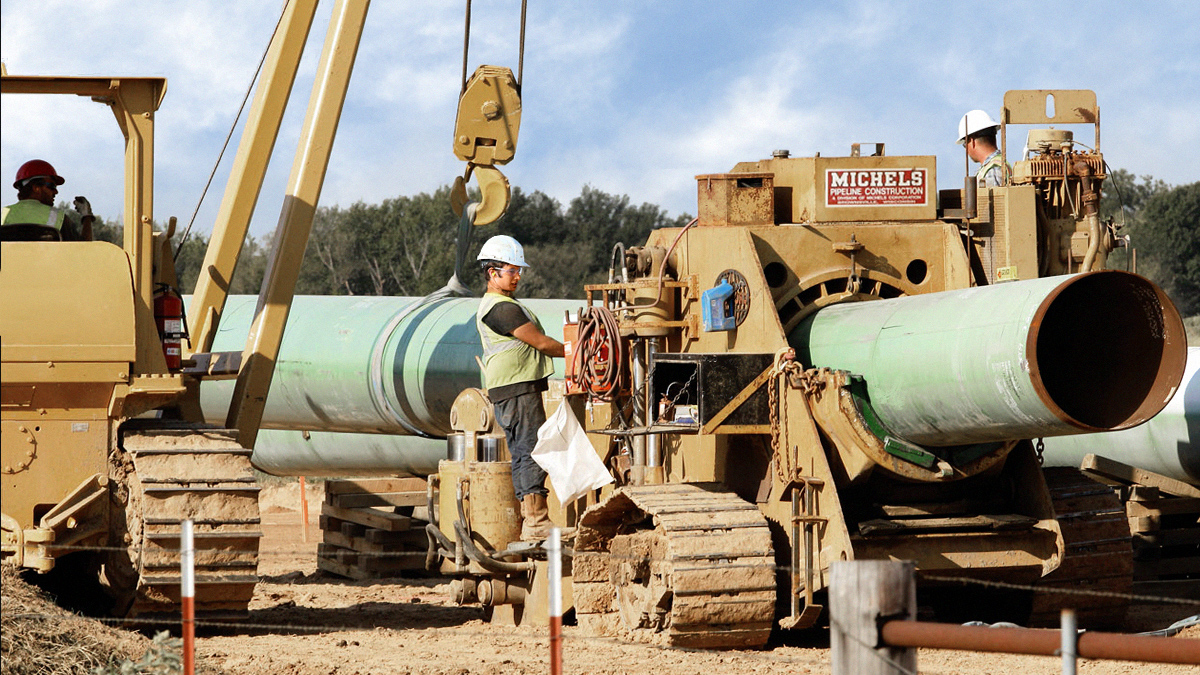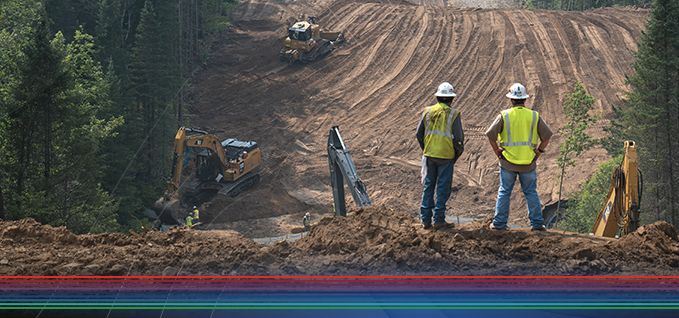Midland oilfield pipeline services: When to schedule pipeline inspections
Wiki Article
Comprehending the Secret Attributes of Pipeline Services and Their Influence On Efficiency
Pipeline solutions play a crucial role in different markets, influencing functional effectiveness noticeably. Trick functions, such as innovative surveillance modern technologies and upkeep methods, are vital for decreasing downtime. Furthermore, governing compliance warranties security and environmental management. The interaction between layout, facilities, and economic aspects can make complex these processes. Recognizing just how these components impact general efficiency raises essential questions regarding best methods and future developments in the area.The Function of Modern Technology in Pipeline Tracking
As developments in technology remain to evolve, the significance of efficient pipeline tracking has actually ended up being increasingly obvious. Modern pipe systems count on advanced surveillance devices that enhance functional efficiency and safety. Technologies such as real-time information analytics, sensors, and drones give drivers with instant insights into pipeline conditions, allowing them to find leaks, corrosion, and various other prospective concerns before they rise right into substantial problems.The combination of Net of Things (IoT) tools has changed typical monitoring approaches, allowing for constant monitoring and automated reporting. This aggressive approach not only lessens risks yet additionally optimizes upkeep schedules and resource allowance. In addition, advanced software application systems help with information visualization and interpretation, empowering decision-makers to respond swiftly to anomalies. Collectively, these technical developments not only enhance pipeline stability but likewise foster ecological stewardship by mitigating the prospective effect of leakages and spills.
Maintenance Approaches for Boosted Performance
Reliable maintenance techniques are necessary for maximizing pipe effectiveness. Executing predictive maintenance techniques, adhering to routine inspection protocols, and establishing robust emergency situation feedback plans can considerably improve operational dependability. These strategies not just reduce downtime but likewise contribute to the overall safety and security and stability of pipeline systems.Predictive Upkeep Methods
Anticipating maintenance techniques are significantly acknowledged for their capability to enhance functional efficiency in pipe services. By leveraging data analytics and keeping track of innovations, these techniques make it possible for drivers to expect devices failings prior to they occur. This proactive strategy decreases unexpected downtime, minimizes upkeep costs, and expands the life expectancy of essential possessions. Sensors and IoT tools play a crucial role in gathering real-time information, permitting for the analysis of devices health and performance fads. Artificial intelligence formulas evaluate this information to identify patterns and forecast possible issues. Pipeline drivers can schedule maintenance tasks during non-peak times, enhancing resource allocation and making certain continuous procedure. Eventually, the fostering of anticipating maintenance promotes a much more dependable and reliable pipe framework.
Routine Examination Protocols
Routine evaluation methods function as a keystone of upkeep techniques focused on improving effectiveness in pipe procedures - Creek Pipe Midland TX. These methods include methodical evaluations of pipe integrity, concentrating on identifying possible problems prior to they intensify. Regular inspections usually consist of aesthetic assessments, leakage discovery innovations, and pressure tracking to assure peak performance. By adhering to recognized schedules, drivers can identify corrosion, product wear, or blockage, therefore reducing downtime and repair service prices. Furthermore, data accumulated throughout assessments can inform predictive maintenance initiatives, permitting a proactive method to pipeline monitoring. Eventually, regular examinations not only extend the lifespan of pipeline framework however also contribute to much safer and more dependable transportation of sources, enhancing general functional effectivenessEmergency Action Planning
Emergency response preparation is necessary for preserving efficiency in pipe operations, making certain that drivers are prepared to resolve unpredicted incidents swiftly and successfully. A well-structured emergency response strategy consists of clear procedures, marked functions, and communication methods to mitigate dangers connected with pipeline failures. Routine drills and training boost team preparedness and acquaint personnel with emergency treatments. Additionally, having easily offered resources, such as spill control tools and emergency get in touch with listings, can substantially lower response times. By incorporating real-time surveillance technologies, drivers can swiftly identify and react to issues, lessening environmental effect and functional downtime. Inevitably, a complete emergency response plan not only safeguards assets and workers yet additionally enhances the overall performance of pipe services.Regulatory Compliance and Safety And Security Standards
Regulatory compliance and security standards play an essential role in the pipeline services sector. Midland oilfield pipeline services. Abiding by sector guidelines ensures that firms implement reliable security procedures and take the chance of administration strategies. This commitment not just additional resources secures workers and the atmosphere however likewise improves overall functional effectivenessConformity With Industry Rules
Compliance with industry regulations is vital for making certain the security and effectiveness of pipe operations. Regulatory structures, such as those developed by the Epa (EPA) and the Pipeline and Hazardous Materials Safety Management (PHMSA), set stringent criteria that operators should comply with. These policies cover numerous elements, including pipe layout, building and construction, maintenance, and monitoring, ensuring that systems run safely and effectively. Non-compliance can bring about severe charges, operational hold-ups, and ecological risks. By sticking to these regulations, pipeline firms not only protect public safety and security and the environment however additionally enhance their functional performance. Ultimately, regulative conformity fosters depend on amongst stakeholders, guaranteeing you could try these out that pipeline services can run flawlessly in a competitive landscape while meeting legal commitments.
Safety Method Implementation
Reliable safety method implementation is a vital component of pipeline operations, carefully linked to governing conformity and safety requirements. Following these procedures not just assures the protection of personnel but likewise safeguards the atmosphere and infrastructure. A durable safety framework consists of routine training, extensive evaluations, and using appropriate safety equipment. Organizations has to remain alert in upgrading their protocols to mirror changes in laws and technological improvements. Conformity with well-known security standards decreases the risk of mishaps and enhances functional efficiency. In addition, a culture of safety and security fosters employee involvement and accountability, adding to general organizational success. Ultimately, reliable safety method execution is critical in keeping the stability of pipeline solutions and accomplishing long-term sustainability in operations.Threat Administration Strategies
Applying durable danger administration methods is essential for guaranteeing that pipe operations follow regulatory needs and security standards. Organizations needs to identify possible hazards and evaluate dangers related to pipeline activities. This entails carrying out extensive evaluations, using advanced surveillance technologies, and maintaining conformity with market regulations. Routine training for workers on security methods boosts situational awareness and prepares teams to respond successfully to emergency situations. In addition, developing contingency strategies and conducting drills can greatly reduce dangers. Collaborating with regulatory bodies ensures placement with advancing safety standards. By prioritizing risk management, pipeline solutions can improve operational effectiveness while safeguarding both the setting and public safety. Inevitably, a proactive approach to risk monitoring cultivates a society of safety and security within the market.Pipeline Design and Facilities Considerations
Just how can the layout and infrastructure of pipelines affect overall operational effectiveness? The setup of pipes plays an essential function in determining their effectiveness. Effective style decreases friction losses, hence minimizing power consumption during liquid transport. Aspects such as diameter, material option, and layout directly impact flow prices and maintenance requirements.Furthermore, strategic positioning of shutoffs and keeping an eye on systems improves functional control and security. Midland oilfield pipeline services. Facilities considerations, including availability for repair and maintenance, considerably impact downtime and general performance
Furthermore, incorporating sophisticated innovation for real-time surveillance assists in prompt discovery of leaks or inadequacies, ensuring quick reactions to concerns. The overall structural honesty, affected by product toughness and ecological variables, also forms lasting operational success. As a result, thoughtful design and durable infrastructure are essential for making best use of pipe performance, ultimately contributing to the integrity and earnings of pipe solutions.
Environmental Influence and Sustainability Practices
While the demand for pipeline solutions remains to expand, understanding the environmental influence and embracing sustainability practices has actually become progressively essential. The construction and operation of pipes can especially affect communities, wild animals environments, and water resources. To reduce these effects, firms are implementing sophisticated innovations and techniques aimed at minimizing exhausts, protecting against spills, and minimizing land disruption.
Sustainability campaigns commonly include using environmentally pleasant materials, improving energy performance, and using eco-friendly power sources to power procedures. In addition, firms are significantly performing extensive environmental evaluations prior to project initiation, guaranteeing conformity with policies and stakeholder engagement.

Expense Monitoring and Economic Consider Pipeline Providers
As the pipe industry expands, effective price administration and comprehending financial variables end up being vital for maintaining competition. Business face numerous financial stress, including varying material costs, labor expenses, and governing compliance costs. To navigate these obstacles, pipe provider should take on tactical financial planning and budgeting techniques.Buying modern technology can boost operational effectiveness, inevitably decreasing prices gradually. Furthermore, effective task administration guarantees that sources are designated efficiently, reducing hold-ups and unanticipated expenditures.

Market problems, such as need for energy and geopolitical factors, additionally affect economic practicality. Firms need to remain agile, changing their strategies in response to these external factors.
Often Asked Questions
What Are the Various Kinds Of Pipeline Solutions Available?
Different kinds of pipeline services consist of transportation, storage, maintenance, assessment, and repair. Each solution plays a crucial role in making certain the seamless activity of products, improving safety, and reducing functional disturbances throughout various markets.Exactly How Typically Should Pipeline Inspections Be Conducted?
Pipeline evaluations should be carried out consistently, usually each to three years, depending upon the kind and condition of the pipeline. Extra frequent evaluations might be required for older or risky pipes to assure security and honesty.
What Are the Main Causes of Pipeline Failures?
The major causes of pipe failures include rust, defective construction, material flaws, exterior damage, leakages, and functional errors. Each element adds considerably to potential threats, highlighting the value of normal upkeep and surveillance for security.Exactly How Can Firms Boost Pipeline Service Integrity?
Companies can enhance pipeline service reliability by applying regular maintenance schedules, using advanced tracking innovations, performing extensive examinations, purchasing staff member training, and taking on aggressive risk administration approaches to prepare for and mitigate potential failures.What Role Do Operators Play in Pipeline Services?
Operators play a necessary duty in pipe solutions by guaranteeing safe transportation, maintaining tools, keeping an eye on system honesty, working with upkeep, and reacting to emergencies. Their proficiency directly affects functional performance and lessens disruptions in solution shipment.Report this wiki page